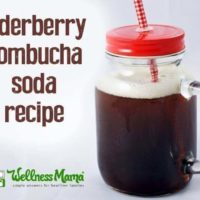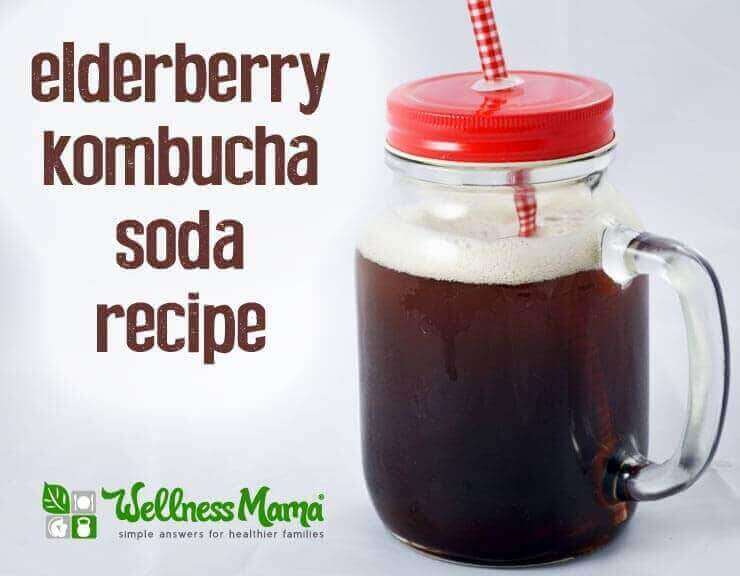Two recipes that are staples in our kitchen, especially at this time of year, are kombucha and elderberry syrup. Kombucha is a great source of beneficial bacteria, enzymes, and vitamins while elderberry is a traditional remedy to ward off illness.
Combine the two and you get a delicious, fizzy, and immune-boosting “soda” that is delicious and easy to make.
What is Kombucha?
If you’ve never made it or tried it before, kombucha is a traditional fermented tea that contains enzymes, probiotics, and vitamins. Though it is brewed with a sweetened tea, the sugar ferments out in the process of making enzymes and probiotics, leaving a finished product with minimal sugar.
Here is a tutorial on getting started with making kombucha and I ordered all of my supplies from Kombucha Kamp. If you aren’t a fan of the DIY version, pre-made kombucha is now available in most grocery stores and even some big box and discount stores.
Benefits of Elderberry?
Elderberries are a traditional remedy for colds and flu. Elderberry syrups, tinctures, and capsules are popping up even in regular grocery stores.
I prefer to make my own elderberry syrup with dried elderberries so I can make sure I use quality ingredients. Here is my original elderberry syrup recipe.
What to do:
When I combined elderberry syrup and kombucha soda it made a perfectly carbonated and slightly sweet drink that was a great way to get the benefits of elderberry and kombucha in one drink. There are two ways to make elderberry kombucha:
- Simple Version: Use pre-made elderberry syrup and homemade kombucha. The elderberry syrup serves as the sugar source for a second ferment which creates carbonation (see this recipe for instructions on why and how to do a secondary ferment) and all you have to do is pour the elderberry syrup into the kombucha. You can also just add 1 teaspoon of elderberry syrup to a glass of pre-carbonated homemade or pre-made kombucha and drink immediately.
- Basic Version: If you don’t already have elderberry syrup on hand, a simpler secondary ferment could be made by simply adding 1 Tablespoon of elderberry juice (made by boiling 1/4 cup dried elderberries in 2 cups water for 45 minutes and adding more water as needed) and 1 teaspoon of raw, organic sugar (it will ferment out) to a 32 ounce mason jar of homemade or store-bought kombucha. Cap this tightly with an airtight lid and leave at room temperature for 2-3 days until desired carbonation is reached and then put in the refrigerator until drinking.

Elderberry Kombucha Soda Recipe
Servings
Ingredients
- 32 oz kombucha premade or homemade
- 1 TBSP elderberry syrup (or 1 TBSP dried elderberries + 1 tsp sugar)
Instructions
- Recipe using elderberry syrup: Combine 1 Tablespoon elderberry syrup with a 32 ounce jar of kombucha. If the kombucha is already carbonated from a secondary ferment, this can be consumed immediately. If not and you want the carbonation, cap the jar tightly with an airtight lid and leave on the counter for 2-3 days before transferring to the refrigerator to store.
- Recipe using dried elderberries: If you don’t already have elderberry syrup on hand, a simpler secondary ferment could be made by simply adding 1 Tablespoon of elderberry juice (made by boiling 1/4 cup dried elderberries in 2 cups water for 45 minutes and adding more water as needed) and 1 teaspoon of raw, organic sugar (it will ferment out) to a 32 ounce mason jar of homemade or store-bought kombucha. Cap this tightly with an airtight lid and leave at room temperature for 2-3 days until desired carbonation is reached and then put in the refrigerator until drinking.
- Enjoy 8 ounces per day.
Nutrition
Ever used elderberries or tried kombucha? What did you think?


Leave a Reply